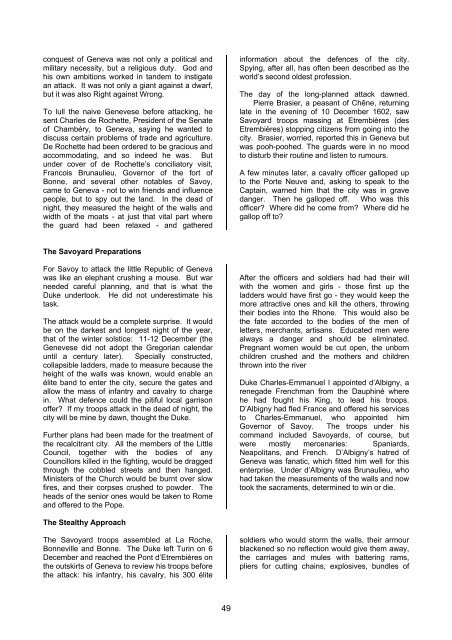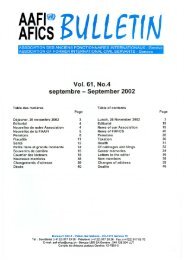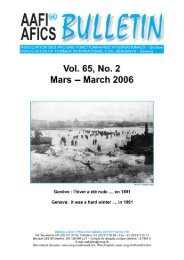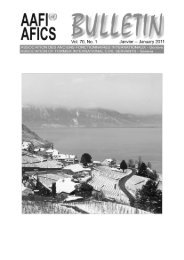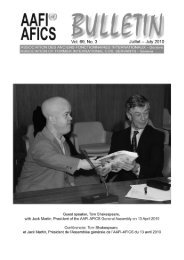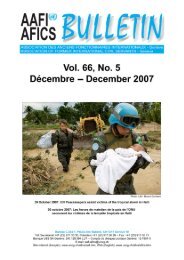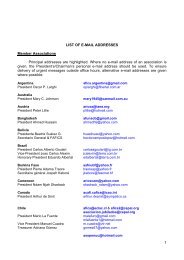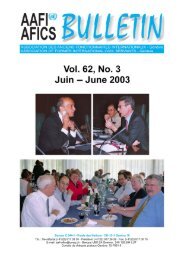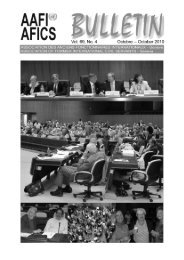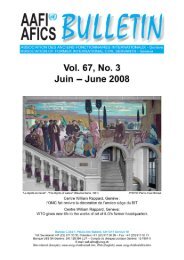nouvelles de notre association - aafi-afics - UNOG
nouvelles de notre association - aafi-afics - UNOG
nouvelles de notre association - aafi-afics - UNOG
Create successful ePaper yourself
Turn your PDF publications into a flip-book with our unique Google optimized e-Paper software.
conquest of Geneva was not only a political and<br />
military necessity, but a religious duty. God and<br />
his own ambitions worked in tan<strong>de</strong>m to instigate<br />
an attack. It was not only a giant against a dwarf,<br />
but it was also Right against Wrong.<br />
To lull the naive Genevese before attacking, he<br />
sent Charles <strong>de</strong> Rochette, Presi<strong>de</strong>nt of the Senate<br />
of Chambéry, to Geneva, saying he wanted to<br />
discuss certain problems of tra<strong>de</strong> and agriculture.<br />
De Rochette had been or<strong>de</strong>red to be gracious and<br />
accommodating, and so in<strong>de</strong>ed he was. But<br />
un<strong>de</strong>r cover of <strong>de</strong> Rochette’s conciliatory visit,<br />
Francois Brunaulieu, Governor of the fort of<br />
Bonne, and several other notables of Savoy,<br />
came to Geneva - not to win friends and influence<br />
people, but to spy out the land. In the <strong>de</strong>ad of<br />
night, they measured the height of the walls and<br />
width of the moats - at just that vital part where<br />
the guard had been relaxed - and gathered<br />
information about the <strong>de</strong>fences of the city.<br />
Spying, after all, has often been <strong>de</strong>scribed as the<br />
world’s second ol<strong>de</strong>st profession.<br />
The day of the long-planned attack dawned.<br />
Pierre Brasier, a peasant of Chêne, returning<br />
late in the evening of 10 December 1602, saw<br />
Savoyard troops massing at Etrembières (<strong>de</strong>s<br />
Etrembières) stopping citizens from going into the<br />
city. Brasier, worried, reported this in Geneva but<br />
was pooh-poohed. The guards were in no mood<br />
to disturb their routine and listen to rumours.<br />
A few minutes later, a cavalry officer galloped up<br />
to the Porte Neuve and, asking to speak to the<br />
Captain, warned him that the city was in grave<br />
danger. Then he galloped off. Who was this<br />
officer? Where did he come from? Where did he<br />
gallop off to?<br />
The Savoyard Preparations<br />
For Savoy to attack the little Republic of Geneva<br />
was like an elephant crushing a mouse. But war<br />
nee<strong>de</strong>d careful planning, and that is what the<br />
Duke un<strong>de</strong>rtook. He did not un<strong>de</strong>restimate his<br />
task.<br />
The attack would be a complete surprise. It would<br />
be on the darkest and longest night of the year,<br />
that of the winter solstice: 11-12 December (the<br />
Genevese did not adopt the Gregorian calendar<br />
until a century later). Specially constructed,<br />
collapsible lad<strong>de</strong>rs, ma<strong>de</strong> to measure because the<br />
height of the walls was known, would enable an<br />
élite band to enter the city, secure the gates and<br />
allow the mass of infantry and cavalry to charge<br />
in. What <strong>de</strong>fence could the pitiful local garrison<br />
offer? If my troops attack in the <strong>de</strong>ad of night, the<br />
city will be mine by dawn, thought the Duke.<br />
Further plans had been ma<strong>de</strong> for the treatment of<br />
the recalcitrant city. All the members of the Little<br />
Council, together with the bodies of any<br />
Councillors killed in the fighting, would be dragged<br />
through the cobbled streets and then hanged.<br />
Ministers of the Church would be burnt over slow<br />
fires, and their corpses crushed to pow<strong>de</strong>r. The<br />
heads of the senior ones would be taken to Rome<br />
and offered to the Pope.<br />
After the officers and soldiers had had their will<br />
with the women and girls - those first up the<br />
lad<strong>de</strong>rs would have first go - they would keep the<br />
more attractive ones and kill the others, throwing<br />
their bodies into the Rhone. This would also be<br />
the fate accor<strong>de</strong>d to the bodies of the men of<br />
letters, merchants, artisans. Educated men were<br />
always a danger and should be eliminated.<br />
Pregnant women would be cut open, the unborn<br />
children crushed and the mothers and children<br />
thrown into the river<br />
Duke Charles-Emmanuel I appointed d’Albigny, a<br />
renega<strong>de</strong> Frenchman from the Dauphiné where<br />
he had fought his King, to lead his troops.<br />
D’Albigny had fled France and offered his services<br />
to Charles-Emmanuel, who appointed him<br />
Governor of Savoy. The troops un<strong>de</strong>r his<br />
command inclu<strong>de</strong>d Savoyards, of course, but<br />
were mostly mercenaries: Spaniards,<br />
Neapolitans, and French. D’Albigny’s hatred of<br />
Geneva was fanatic, which fitted him well for this<br />
enterprise. Un<strong>de</strong>r d’Albigny was Brunaulieu, who<br />
had taken the measurements of the walls and now<br />
took the sacraments, <strong>de</strong>termined to win or die.<br />
The Stealthy Approach<br />
The Savoyard troops assembled at La Roche,<br />
Bonneville and Bonne. The Duke left Turin on 6<br />
December and reached the Pont d’Etrembières on<br />
the outskirts of Geneva to review his troops before<br />
the attack: his infantry, his cavalry, his 300 élite<br />
soldiers who would storm the walls, their armour<br />
blackened so no reflection would give them away,<br />
the carriages and mules with battering rams,<br />
pliers for cutting chains, explosives, bundles of<br />
49


